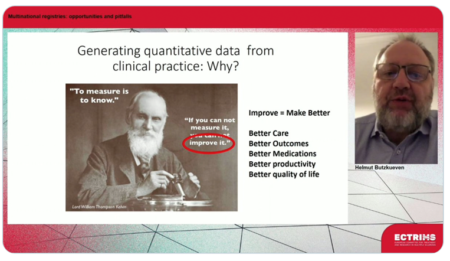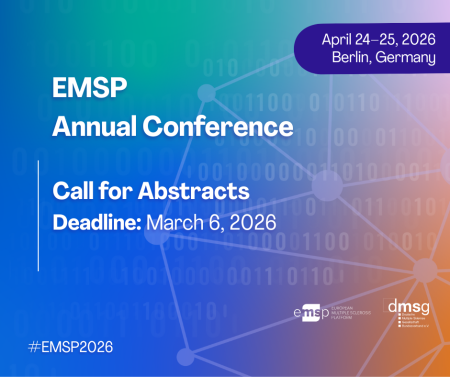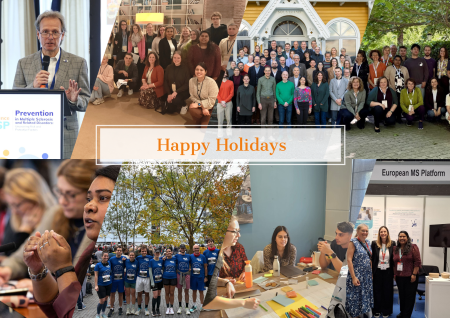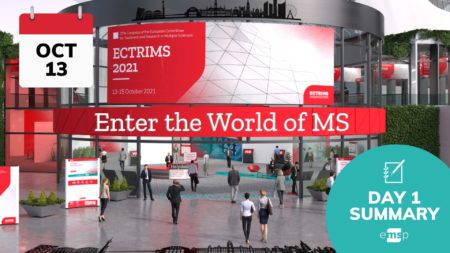
ECTRIMS 2021 Day 1 – The Digital Experience in Multiple Sclerosis has started
14.10.2021This years’ ECTRIMS Congress – the 37th Congress of the European Committee for Treatment and Research in Multiple Sclerosis – is virtual again. The World’s largest meeting in MS takes place from October 13 to 15 featuring a very interesting programme packed with scientific sessions, Hot Topic sessions about themes like diseases progression or even Meet the Experts sessions where the attendees have the unique opportunity to ask experts in live about burning issues. ECTRIMS in numbers are 9000 Participants from 100 countries, 200 excellent speakers from academia, science, research and last, but not least Neurologist will discuss MS during the next days. 50 international exhibitors coming from patient organizations, industry, research and development and more, show new insights and present a total of 1700 abstracts.

It is all about progression!
MS progression is one of the hot topics during ECTRIMS this year. Measuring is difficult and we have to find new methods or also adjust methods to identify progression faster to help people living with MS better. Because we already know from different studies that progression begins very early. So, there must be new measurements defined and found. MRI is extremely important to identify progression and it is recommended to do it yearly. Especially the brain, but the spinal cord can be done in a longer time frame. If a patient is stable, it is also not necessary to use Gadolinium for every MRI scan. Another important tool to diagnose MS is OTC – Optical Coherence Tomography – as “it can tell you something about what is happening!”, Axel Petzold mentioned.
The outcome of this session is very clear: it is important to understand progression better as we have incomplete definitions and measurements available. There must be better strategies in place and also strong frameworks are required.
New Format: Ectrims Fishbowl
The Fishbowl is something new. Experts can discuss and come also on stage. One of the fishbowls discussed the improvement of clinical outcomes through remote sensor-based digital assessment. Or we could say: It is all or a lot about data. “Sensors like Fitbit or a smartwatch can help people living with MS to measure their symptoms or biomarkers like pulse and so on. But we have to be sensitive to do it” – Thomas Berger from Vienna mentioned.
It is important to develop senseful tools to measure symptoms or also issues a person with MS could have. It can help to have a bigger picture of a patient but we have to organize and structure the data and also the tools. We can see, that digital health tools and digital health solutions are hot because patients use those tools already, but the development must be done carefully and must satisfy the people, which means doctors, healthcare professionals and of course patients. There is a lot of work to do, especially when it comes to the use of data and the quality of data must be defined, since as we know, not every dataset is good or useful.
In summary, patients must be more centred and included in collecting data and developing digital health solutions.
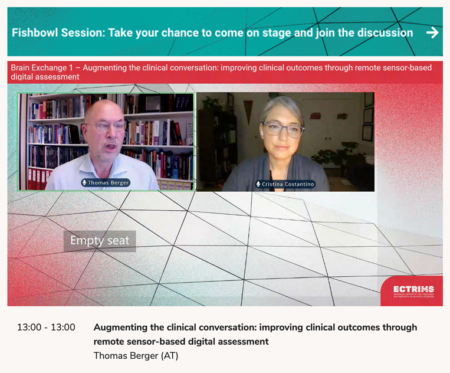
Do we need to measure everything? How can data help patients?
PRO or PROMS – Patient-Reported Outcomes have been actively discussed for a while now. It is important to be informed about the patient population. Quality of Life, socio-economic situation and other aspects do have an impact on the life of a patient. The use of medication, digital tools or physiotherapy and occupational therapy can have an impact on the mood and the wellbeing of a person living with Multiple Sclerosis. During the sessions, we could see, that this theme gained particular importance. We have to know how patients feel during their pathway with MS and also when they use therapy, tools or if they participate in a clinical trial. PRO or PROMS can collect more data about a person living with MS and let us know the most important facts about a patient population.
One issue of the PROs is that they are not always asking the things patients want to talk about or what they want to know. So, there is a need to create better PROs to find out more about the person beyond the patient. In different sessions, it became clear that we have to work on this to have a more holistic picture of people living with MS.
Another important message regarding collecting data from people with MS came from Prof. Butzkueven who talked about collecting data in multinational registries and why this data should be recorded also from clinical practise:
“It is to improve the quality of life for people living with MS. Quantitative Data can help to improve care, outcomes, medication or productivity and make it better. Most importantly, the quality of life must be improved too.”
Discussing NMOSD
Neuromyelitis Optica Spectrum Disorder (NMOSD) is also known as Devic disease. It is a chronic disorder affecting the brain and the spinal cord. Mostly it is dominated by inflammation of the optic nerve (optic neuritis). It is in some points like MS in the first sight as it affects the brain and the spinal cord and also the optic nerve. Sometimes people living with NMOSD are misdiagnosed with MS, although it is an autoimmune disease like MS.
There are some differences between MS and NMOSD. For instance, there is an autoantibody in the body of people with NMOSD, which is not present in the case of people living with MS. When we have a look at the symptoms, those can be very diverse when a person lives with MS. People with NMOSD however, experience mostly impaired vision and paralysis in arms or legs. In the scientific programme of ECTRIMS, this issue gained ground in the discussions since there is a need to find out more about both diseases and the differences between them.
COVID-19 and MS Relapse Risk
Prof. Anat Achiron, MD, from the Sheba Medial Centre, Tel Aviv told in a session about MS Therapy and Covid, that there is no increased risk of relapse with a COVID-19 vaccination. In a study where 550 people with MS received the first dose and 435 a second dose of the Pfizer-BioNTech COVID-19 Vaccine, it was found that there was no increased risk of relapse noted over a 20-38 day follow up.
What’s next?
We’re over a quite busy first day with a lot of information exchange, sharing and discussions about the needs in disease management, quality of life and progression of the disease. There are a lot of things going on and it is clear, the pandemic hasn’t stopped Research and Development in MS.
Hot Topics besides Progression, PRO and Health Data will be discussed during the next days: new therapy options, quality of life, Biomarkers and Biosensors in MS. Rehabilitation is also taking the stage, given that people living with MS need more support and also techniques to recover and find ways to feel better.
To summarize, besides the hot topics, there are many other themes to discover at this years’ programme and today we will have a look at some posters and will report again from different sessions.
For live updates please follow our Twitter account @eumsplatform and the #ECTRIMS2021 hashtag for more news and information.
Other summaries
Did you miss the world’s largest meeting dedicated to the understanding and treatment of MS? This year’s digital congress had almost 6,800 participants – but it isn’t too late for you to register for ECTRIMS 2021! Registration will be open until 4 January 2022 at 23:59 CEST. Below we’ve collected some extra summaries of the congress if you’d like to dig deeper into what was discussed during the 3-day congress.
MStranslate is an online science communication initiative from Australia, providing accurate, unbiased, easy to understand information about multiple sclerosis research and news worldwide. Their aim is to remove the complexity of the science to make it easily accessible for every member of the MS community. As every year, they have been covering ECTRIMS in live on Twitter and also developed a short summary video – from the virtual Vienna where the congress was supposed to take place in live – covering the latest research outcomes presented during the congress in different topics like:
- COVID-19 vaccines
- Progressive MS
- New potential treatments
- Managing sleep disturbance
You can watch their day 1 summary and follow their channel here:
ECTRIMS itself has also developed clickable PDF congress reports, where you can quickly navigate and read the summaries of certain sessions within the four topics: Clinical, Pathogenesis, Imaging and Non-Imaging and Biomarkers /Translational Therapy. Check out the official ECTRIMS Congress Report Day 1 – 13 October here!
CME Accreditation and Certificate of Attendance
You may earn up to 12 CME credits at ECTRIMS 2021. CME credits are automatically awarded if you have watched at least 50% of an accredited session and have completed the session evaluation. Register until 4 January 2022 to benefit from the CME credits.
 Your Account
Your Account